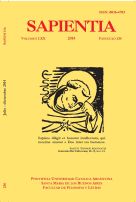Por favor, use este identificador para citar o enlazar este ítem:
https://repositorio.uca.edu.ar/handle/123456789/4608| Título: | Nominalismo o moral y sus implicancias en la praxis política | Autor: | Vogliazzo, Mariana Laura | Palabras clave: | IGLESIA CATOLICA; NOMINALISMO; FILOSOFIA POLITICA; Tomás de Aquino, Santo, 1225?-1274; Guillermo de Occam, O.F.M., ca. 1285-ca. 1349; MORAL | Fecha de publicación: | 2014 | Editorial: | Pontificia Universidad Católica Argentina. Facultad de Filosofía y Letras | Cita: | Vogliazzo, M. L. Nominalismo moral y sus implicancias en la praxis política [en línea]. Sapientia. 2014, 70 (236). Disponible en: https://repositorio.uca.edu.ar/handle/123456789/4608 | Resumen: | Resumen: El nominalismo, surgido en el seno de la Iglesia Católica, significó una ruptura total con la tradición tomista. En términos morales el núcleo central de esta revolución nominalista estará dado por una nueva concepción de la libertad, y por el lugar que aquélla ostentará en el conjunto de las potencias humanas. Siendo la esencia misma del alma con su orden intrínseco de facultades y hábitos operativos lo que se rompe a partir de aquélla. La libertad se erigirá así como una especie de absoluto, ocupando el lugar de potencia principal y máxima en la estructura ontológica del alma humana. Como corolario de esta situación el nominalismo rechazará de la doctrina moral tomista las inclinaciones naturales, la ley natural, la tendencia necesaria de la voluntas ut natura a la felicidad, y la teoría tomista de los hábitos y las virtudes como disposiciones naturales, permanentes y libres de las potencias a obrar. Abstract: Nominalism, emerged within the Catholic Church, represented a complete break with the Thomistic tradition. In moral terms, the core of this nominalist revolution is given by a new conception of freedom, and the place that it will hold in all human powers. Being the very essence of the soul with its intrinsic order of powers and operating habits that breaks from it. Freedom will stand as a sort of all, taking the place of principal and maximum power in the ontological structure of the human soul. As a corollary of this situation nominalism reject moral teaching of Thomistic natural inclinations, natural law, necessary trend voluntas ut natura happiness, and the Thomist theory of habits and virtues as natural, permanent and free provisions of the power to act. |
URI: | https://repositorio.uca.edu.ar/handle/123456789/4608 | ISSN: | 0036-4703 | Disciplina: | FILOSOFIA | Derechos: | Acceso Abierto | Fuente: | Sapientia, 70(236), 2014 |
| Aparece en las colecciones: | SAP - 2014 Vol LXX nro. 236 |
Ficheros en este ítem:
| Fichero | Descripción | Tamaño | Formato | |
|---|---|---|---|---|
| nominalismo-moral-praxis-politica.pdf | 170,79 kB | Adobe PDF |  Visualizar/Abrir |
Visualizaciones de página(s)
268
comprobado en 30-abr-2024
Descarga(s)
331
comprobado en 30-abr-2024
Google ScholarTM
Ver en Google Scholar
Este ítem está sujeto a una Licencia Creative Commons

